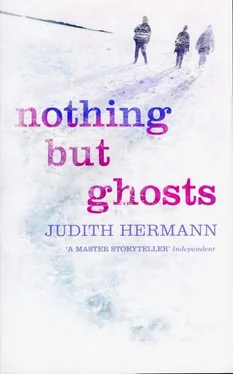Then she smiled. ‘It’s awful, awful, awful,’ she said, looking not at all unhappy. ‘You have to tell me what you think of him, all right?’ she said. ‘You have to be honest.’ And I said, ‘Ruth – ’ and she said, very serious, ‘It’s important to me.’ Things had become more difficult with Raoul last week; there was a fight, a stupid misunderstanding, all in the past now, and yet…Evidently there was some sort of ex-wife in Munich with whom he had long telephone conversations while Ruth was in the room; from time to time he withdrew, didn’t keep dates, or arrived late, was sometimes untalkative, sullen and then again euphoric, impatient, intoxicated with Ruth’s beauty.
She wasn’t sure what he wanted from her; she said, ‘Maybe he only wants to go to bed with me.’ Up to that point he hadn’t yet done that. And there were these rumours. Someone said he had a reputation and it wasn’t the best. Actually something like that wouldn’t rattle Ruth. Still, she said, ‘I don’t want to become his trophy, you know?’ looking at me so innocently and openly that I was almost ashamed, ashamed for myself, for Raoul, for the rest of the world. I said, ‘Ruth, that’s silly, you’re not a trophy. Nobody is going to betray you, and nobody wants to prey on you; that much I know.’ I meant it sincerely, and for the moment Ruth looked comforted and reassured. She took my hand and said, ‘And you? How are you?’
As always, I evaded the question and, as always, she allowed me to be evasive, and then we sat there like that, sleepy in the afternoon light, feeling close. Towards seven o’clock Ruth had to go to the theatre, and I went with her.
Ruth, sleeping. When we shared our first apartment – how many years ago? was it five, ten? – we slept in one bed. Often we went to bed at the same time, lay next to each other, face to face, Ruth’s eyes dark and shiny in the night; she would whisper half-sentences, hum softly, then I would fall asleep. I could never have gone to sleep like that with a man; I don’t know whether Ruth could. Her sleep was deep and sound, heavy and motionless. She always lay on her back, her long hair fanned out around her head, her face relaxed, like a portrait. She breathed quietly and slowly. I always woke up before she did and then I lay there, my head supported on my hand, watching her. I remember that once, during one of our rare arguments, I threatened to cut off her hair while she slept. I don’t want to believe that I could ever have said something like that, but I know it’s true.
Ruth owned a nightmarishly huge metal alarm clock; its earsplitting ring was the only thing that could actually wake her. The alarm clock stood on her side of the bed, and even though I was always awake first, I never woke her up but let the crazy ringing do it; she emerged from sleep visibly tormented, opened her eyes, hit the ‘off button on the alarm, and immediately groped for the cigarettes she always put next to her side of the bed at night. She would light one, sink back into the pillows, smoke, sigh, and at some point she would say, ‘Good morning.’ Later, in other apartments and other beds, she gave up smoking in the morning. Maybe because by then we were no longer waking up together.
Ruth was playing the role of Eliante in Molièere’s Misanthrope. I had seen her in many productions while she was an acting student at the academy. As a Viking king in Ibsen’s The Vikings of Heligoland her small form was wrapped in a bear pelt and her hair arranged like a cloud around her head. She was carried on stage on a sea of lances and bellowed her soul out for two hours. As Lady Macbeth she was suspended head down by silken threads in front of a white wall and made fishlike gliding motions with her hands. But I thought she was strangest as Mariedl in Schwab’s Lady Presidents, scarcely recognizable in a grey house-cleaning smock, cowering under a table. Ruth was a good actress, a comedienne with great stage presence, very physical, but she was always Ruth to me; I recognized her, her face, her voice, her posture.
Perhaps it was because I was always trying so hard to recognize her – the Ruth who dressed in the morning, slowly, carefully, one item after the other, then looked in the mirror with that special expression intended only for the mirror, and always sideways. The Ruth who drank her coffee holding the cup with both hands and not setting it down till she had emptied it, the way she smoked, made up her eyelashes, smiled into the receiver with her head tilted to one side when she was on the phone.
She had wanted to impersonate me, do a portrait study of me, and she followed me around for three days with a scholarly expression on her face, imitating my movements until I stopped, stood stock still in a corner of the room, and yelled at her to quit it. Later she imperson-ated her mother with a precision and attention to detail that made me shudder.
The staging of The Misanthrope was straightforward and faithful to the original, far removed from the chaotic and improvisational student productions. At first I was bored; then I found it beautiful, perhaps because, for the first time, I saw Ruth as if from afar, unencumbered by pretentious suspensions from steel scaffolding. She was wearing a kind of white children’s sailor suit with her hair twisted into a braid; her face was clearly defined, thoughtful and sensible. Perhaps her voice was a little too trembly for Eliante, too cracked, as if she were choking, and not quite authentic: ‘That isn’t really how love works at all for most people. You find that a man in love always justifies his own choice. His passion makes him blind to all faults and in his eyes everything in the woman he loves is lovable. He counts her defects as perfections or finds flattering names for them.’
I was disappointed and at the same time relieved not to see her in the role of Céelimèene, the foolish, vulnerable, loving Céelimèene. There was sustained applause after each act; but, then, I had expected nothing less in this small town. Ruth took a deep bow, beaming, radiant. She had a new habit of immediately running off stage like a child; in other productions she had gone off hesitantly and reluctantly.
I remained in my seat till the last person in the audience had left the auditorium. The stagehands were beginning to dismantle the sets and the lights were turned off. Dust rained down onto the stage. There were times when I had envied Ruth her talent, her profession, the applause, the possibility of fame. But this envy faded at some point when I realized that I was absolutely unsuited, really quite impossible, for the theatre. I sat in the empty row of seats, leaning forwards, and tried to understand Ruth, to understand what she was doing here, how she worked, what she felt. I couldn’t, didn’t understand a thing, and then I stood up and went to the theatre canteen. Raoul’s performance on the second stage would be finished at about eleven o’clock; Ruth had asked me to wait with her for him.
On the day she moved out of the apartment we shared and left Berlin for this small town, I was in no state to carry even a single box out to the removal van. Her entire family had come to help with the move, her mother, her two sisters, and her brother and his wife. We all had breakfasted together; it was January and the harsh winter sunlight streamed pitilessly through the windows. I had tried to draw out breakfast as long as possible but then it was over, and everybody got up and began to pack Ruth’s things, while I sat as if turned to stone in my chair at the table, with the remains of our breakfast. I clutched the arms of the chair; I couldn’t move; couldn’t even get up.
Ruth’s family worked around me; they pushed bureaus, chairs, cartons across the room, carried Ruth’s suitcases and boxes, her bed, her bookshelves, her kitchen cupboard, her desk, all of her things, down the three flights of stairs, all the while making it clear how impossible and rude they thought I was. I couldn’t help it; I sat there motionless, mute.
Читать дальше












